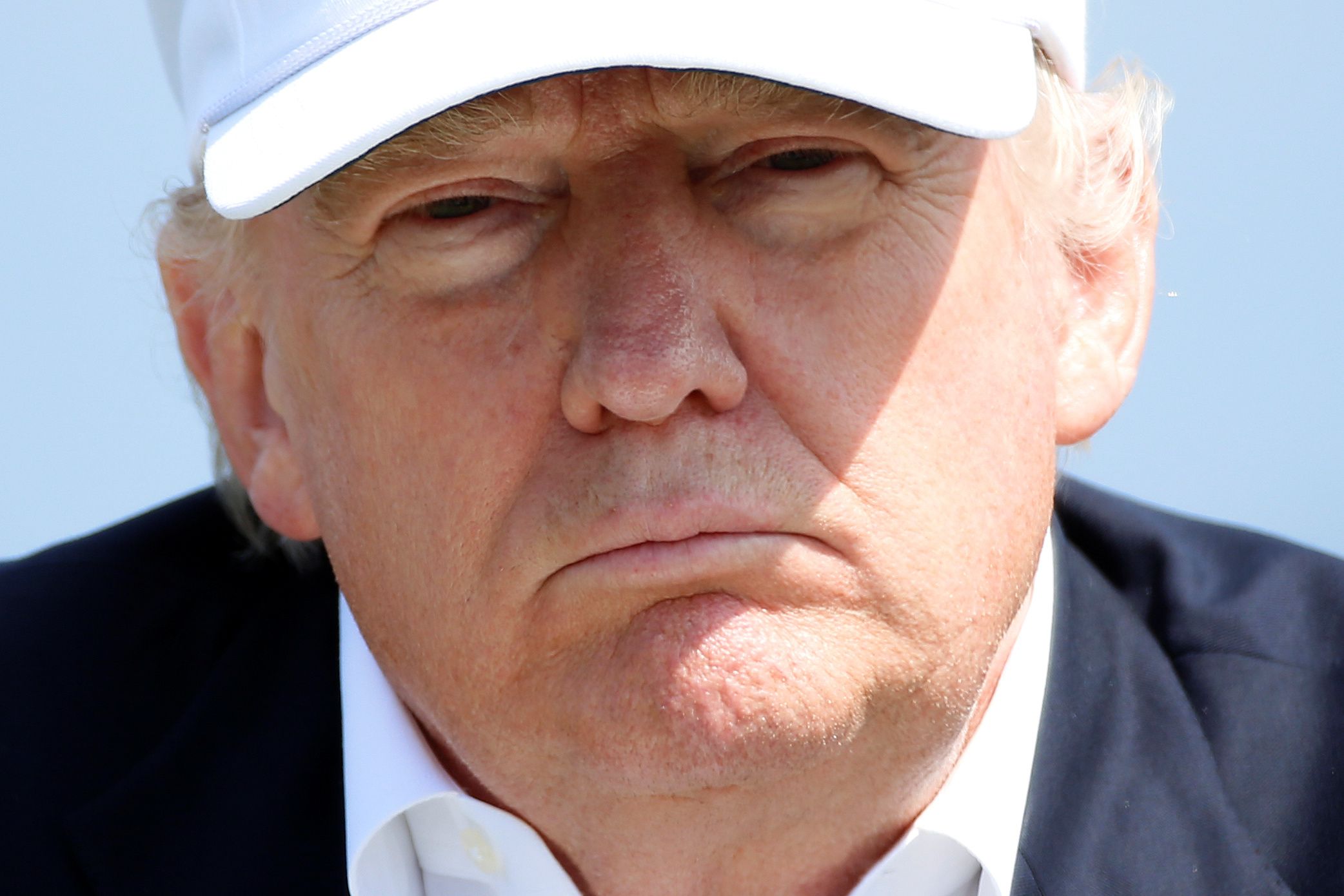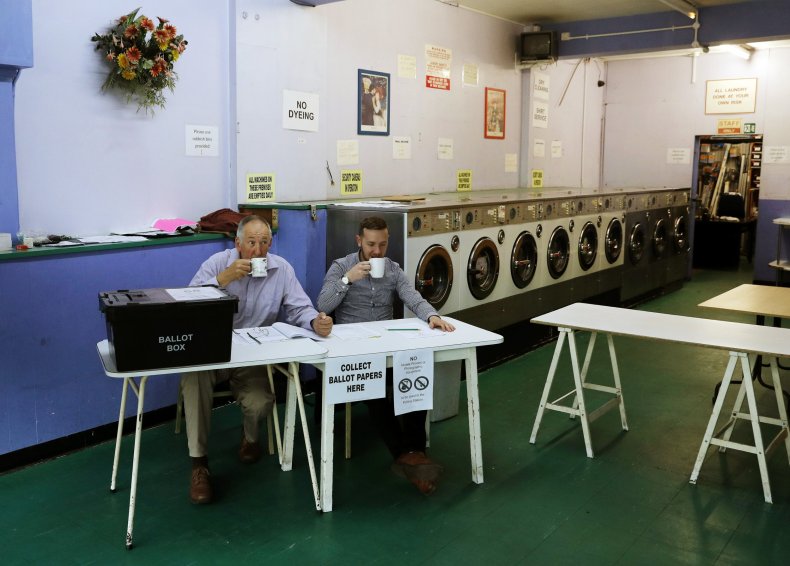
In the weird, bizarre Anglo-American political turmoil that the world woke up to on Friday, it makes perfect sense that Donald Trump was in the United Kingdom, spouting off about the Brexit, the island nation's earthshaking vote to quit the European Union.
"I think I see a big parallel, people really see a really big parallel," the presumptive GOP presidential nominee said in Scotland from one of his branded golf courses, donning his now iconic "Make America Great Again" hat. The mogul was referring to the likeness between his anti-establishment campaign and the triumphant "Leave" campaign in the U.K. "People want to take their country back," he said.
Does the Brexit mean Trump can win? Is the political class in the United States underestimating the grievance-fueled, anti-globalization politics symbolized by Trump, just as their counterparts in Great Britain have done?
It's certainly irresistible to compare the two movements. Both emerged in recent years and were dismissed by the political establishments. Both the Leave campaign and the Trump juggernaut have been fueled by a combustible mix of resentments over immigration, trade and feelings that national sovereignty is best. Each has lamented what it sees as a collapse of borders that is allowing what is perceived as unimpeded immigration. On both sides of the Atlantic, the establishment clung to the hope that Trump's campaign and the push for a Brexit would eventually fade.
When it comes to demographics, the Trump and Leave campaigns bear an uncanny resemblance. Each were dominated by white working-class voters and older voters (who themselves skew white because the country was much whiter when they were born). Urban, upscale voters voted for Remain in Britain, just as they are anti-Trump in the U.S. Thursday's victory saw cosmopolitan London skewing about 60-40 for Remain, but it was outgunned by the rest of England and Wales, which went about 60-40 for Leave.
Scotland and Northern Ireland were solidly for staying in the U.K., but since their populations are so much lower, their votes weren't't enough to keep the country in the EU. Recall that Scotland came close to leaving the U.K. in its own referendum in 2014; it may well now bolt, as its populace is so pro-EU. And in both British-controlled Belfast in Northern Ireland and Dublin in the independent state of Ireland, there's talk about possible unification of the Irish isle—or, at the very least, worry about whether to fortify the now open border between north and south.
Despite what Trump calls the parallels between his unlikely rise and the triumph of the Leave campaign in the U.K., there are some pretty big differences. Trump would have a much tougher time prevailing in the U.S.
First, while Britain voted for an action, a concept—let's leave Europe—America is electing a president, a commander in chief. That means Trump will be judged for all of his individual strengths and flaws—his comments about women and minorities, his questionable business dealings, his wild, cranky insults.
Second, Britain held a straight majority vote. In the U.S., there's the Electoral College, which is a tougher hurdle for Trump. He may rack up big majorities in Republican-red states like Alabama or Wyoming, but the all-important swing states are very close. The Electoral College tends to amplify majorities. In the 2012 presidential election, Barack Obama garnered 51.1 percent of the popular vote, compared with 47.2 percent for Mitt Romney—a margin similar to Leave's win in the U.K. (The remaining U.S. votes were minor parties.)
But the Electoral College spread was 332-206. Since 1992, 18 states, plus the District of Columbia, have voted for Democrats, and their electoral count is 242, very close to the 270 needed to win. That doesn't mean Trump can't win, but he'd have to not only crack that wall but smash it. He would need to win major swing states like Pennsylvania, Ohio, Michigan and Virginia and keep all the Romney states to capture the White House. It's possible, but it's a tough climb—tougher than what Leave had to scale in Britain.
Third, America is more diverse than the U.K. The black population is 13.7 percent of the total, and the Hispanic population is about 17 percent, while those of Asian ancestry are about 5.6 percent. In the U.K., those of Asian ancestry—the largest minority group—constitute only about 7 percent of the population, while blacks constitute about 3 percent. Other minorities are about 1 percent.
In other words, the Trump pool of white voters in the U.S. is much, much smaller than the Leave pool of white voters in the U.K. Because the U.S. population has shifted so dramatically, Romney's 59 percent of the white vote matched George H.W. Bush's in 1988, but because the white vote as a share of the total had declined so precipitously, Romney lost an election that Bush easily won. Romney got a larger percentage of the white vote than Ronald Reagan did in 1980 and still lost. Again, America has become nonwhite faster than Britain.
Finally, the other problem for Trump is that Britain went first, and the results don't look great. Markets plummeted on Friday following the Leave vote. Even if they stabilize, Britain looks ready for a very rocky six months as the Leave campaign basks in its "independence" while, ironically, the U.K. begs the EU for good trade terms. The Leave campaign may seem sobering to Americans—and other Europeans—in the months ahead. Trump could still win despite that. But that'll prove very difficult.
Correction: The original version of this story misspelled the verb tense for cling. It's clung, not clang.
Uncommon Knowledge
Newsweek is committed to challenging conventional wisdom and finding connections in the search for common ground.
Newsweek is committed to challenging conventional wisdom and finding connections in the search for common ground.
About the writer
Matthew Cooper has worked for some of America's most prestigious magazines including Time, The New Republic, National Journal, U.S. News ... Read more
To read how Newsweek uses AI as a newsroom tool, Click here.









